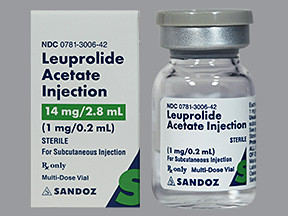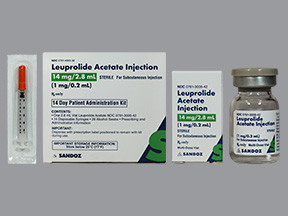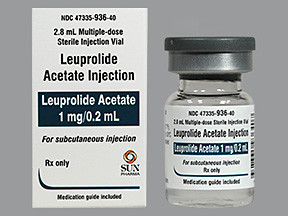LEUPROLIDE - INJECTION
PHONETIC PRONUNCIATION: (LOO-proe-lide)
COMMON BRAND NAME(S): Lupron
GENERIC NAME(S): leuprolide acetate
Uses
USES: Leuprolide is used to treat advanced prostate cancer in men. It is not a cure. Most types of prostate cancer need the male hormone testosterone to grow and spread. Leuprolide works by reducing the amount of testosterone that the body makes. This helps slow or stop the growth of cancer cells and helps relieve symptoms such as painful/difficult urination. Talk to your doctor about the risks and benefits of treatment. Leuprolide is also used to stop early puberty (precocious puberty) in children. It helps to delay sexual development (such as growth of the breasts/testicles) and the start of menstrual periods. It also helps slow down early bone growth to increase the likelihood of reaching normal adult height. Leuprolide works by decreasing the amount of sex hormones that a child's body makes (estrogen in girls, testosterone in boys).
How to use LEUPROLIDE - INJECTION
HOW TO USE: Read the Medication Guide and, if available, the Patient Information Leaflet provided by your pharmacist before you start using leuprolide and each time you get a refill. If you have any questions, ask your doctor or pharmacist. This medication is given by injection under the skin as directed by your doctor, usually once a day. In children, the dosage is based on weight and response to treatment. The doctor should consider stopping treatment before age 11 for girls and age 12 for boys. Consult the doctor for details. If you are using this medication at home, learn all preparation and usage instructions from your health care professional and the product package. Learn how to store and discard medical supplies safely. Before using, check this product visually for particles or discoloration. If either is present, do not use the liquid. Before injecting each dose, clean the injection site with rubbing alcohol. Change the injection site each time to lessen injury under the skin. Use this medication regularly to get the most benefit from it. To help you remember, use it at the same time each day. During the first few weeks of treatment, your hormone levels will actually go up before they go down. This is a normal response to this medication. Your symptoms may get worse for a few weeks. If you have prostate cancer that has spread to the spine or caused urinary blockage, you may require closer monitoring by your doctor, especially when you first start treatment. Tell your doctor right away if you have any bone pain, numbness/tingling/weakness of the arms/legs, blood in the urine, painful/difficult urination, unusual weakness, or inability to move. If you are using this medication to stop early puberty, you may notice worsening symptoms (such as menstrual periods) at the start of treatment. However, you should see an improvement in symptoms usually within 1 to 2 months. Tell the doctor promptly if new or worsened symptoms develop after starting treatment.
Side Effects
Precautions
Interactions
Overdose
Images
Reviews
Faq for LEUPROLIDE - INJECTION
Leuprolide injection is primarily used for the treatment of advanced prostate cancer and endometriosis. It is also sometimes prescribed to manage certain reproductive disorders and as a part of assisted reproduction techniques.
Leuprolide injection acts by suppressing the production of certain hormones in the body. It reduces the production of testosterone in males, which helps in managing prostate cancer, and it lowers estrogen levels in females, which is beneficial for endometriosis treatment.
Leuprolide is usually injected under the skin (subcutaneously) or into a muscle (intramuscularly). The exact method and dosage will be determined by the healthcare provider.
Some common side effects of Leuprolide injection include hot flashes, increased sweating, decreased libido, erectile dysfunction, vaginal dryness, mood swings, fatigue, injection site reactions, and bone density loss.
Although rare, some serious side effects of Leuprolide injection may include allergic reactions, bone fractures, increased risk of cardiovascular events, changes in blood sugar levels, and mental health issues like depression or anxiety. It is important to seek immediate medical attention if any severe side effects occur.
Leuprolide injection is generally not recommended during pregnancy as it may harm the unborn baby. It is also not recommended during breastfeeding, as it can pass into breast milk and may harm the nursing infant.
Leuprolide injection may interact with certain medications, including hormonal birth control methods, certain cancer medications, and certain antibiotics. It is important to inform the healthcare provider about all the medications being taken to avoid any potential interactions.
The full effects of Leuprolide injection may take several weeks or months to become noticeable. The healthcare provider will monitor the progress and adjust the treatment plan accordingly.
Leuprolide injection may be prescribed to children for certain medical conditions, including central precocious puberty (early onset of puberty). The dosing and administration will be determined by the healthcare provider based on the child's specific needs.
Disclaimer
IMPORTANT: HOW TO USE THIS INFORMATION: This is a summary and does NOT have all possible information about this product. This information does not assure that this product is safe, effective, or appropriate for you. This information is not individual medical advice and does not substitute for the advice of your health care professional. Always ask your health care professional for complete information about this product and your specific health needs.



No Reviews Yet